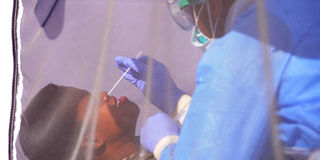Prime
Covid-19 to increase HIV infections, deaths – UN report

A woman taking Covid-19 test recently. PHOTO/ FILE
What you need to know:
- The total number of people living with HIV/Aids was 1.5 million as of December 2019 as compared to 1.2 million in 2010.
Covid-19 related disruption to sexual reproductive health services and access to antiretroviral (ARVs) medication will increase HIV/Aids infections and deaths, the United Nations has warned.
A report released yesterday by the joint United Nations Programme on HIV/Aids (UNAIDS) indicates that the ongoing Covid-19 pandemic could result in 293,000 new HIV infections and up to 500,000 additional Aids-related deaths between 2020 and 2022.
Titled “Prevailing against pandemics by putting people at the center”, the report indicates that between March and September, testing for HIV/Aids declined by up to 50 per cent as concentration was channelled to Covid-19 response.
Testing for HIV is important for those affected to be enrolled in treatment and minimise deaths or reduce chances of spreading when their viral load is suppressed.
The executive director of UNAIDS, Ms Winnie Byanyima, said the global Aids response was off track even before Covid-19.
“The collective failure to invest sufficiently in comprehensive, rights-based, people-centred HIV responses has come at a terrible price,” Ms Byanyima said.
She added: “Implementing just the most politically palatable programmes will not turn the tide against Covid-19 or end Aids. To get the global response back on track will require putting people first and tackling the inequalities on which epidemics thrive.”
Cities and landing sites hotspots
Dr Dan Byamukama, the head of HIV prevention at the Uganda Aids Commission (UAC), said urban areas, cities and fishing communities are the major hotspots for HIV spread.
He said although the national prevalence of HIV is 5.5 per cent, Mbarara City stands at 15.4 per cent, Gulu City is at 14 per cent and Kalangala District, which hosts fish mongers, has HIV prevalence of 17.4 percent.
Some districts like Kibuku has prevalence as low as 1.6 per cent and Nabilatuk has 0.2 per cent.
Speaking to civil society activists and mayors under the Alliance of African Mayors’ Initiative for Community Action on Aids (AMICAALL), in Mukono, Dr Byamukama said new strategies are needed in HIV fight.
He said there is need to condemn stigma that affect the number of people going for testing and picking up ARV drugs.
Dr Byamukama said they will concentrate the fight in urban areas and emerging cities.
“Although we have made progress in HIV fight, the number of people who are living with the virus is rising and more people are also dying from the disease,” Dr Byamukama said.
The total number of people living with HIV/Aids was 1.5 million as of December 2019 as compared to 1.2 million in 2010. However, the annual Aids-related deaths reduced to 21,000 in 2019 from 53,000 in 2010, according to information from UAC.
Dr Byamukama said one in two girls have inaccurate information about HIV/Aids and so are more likely to contract the deadly virus.




